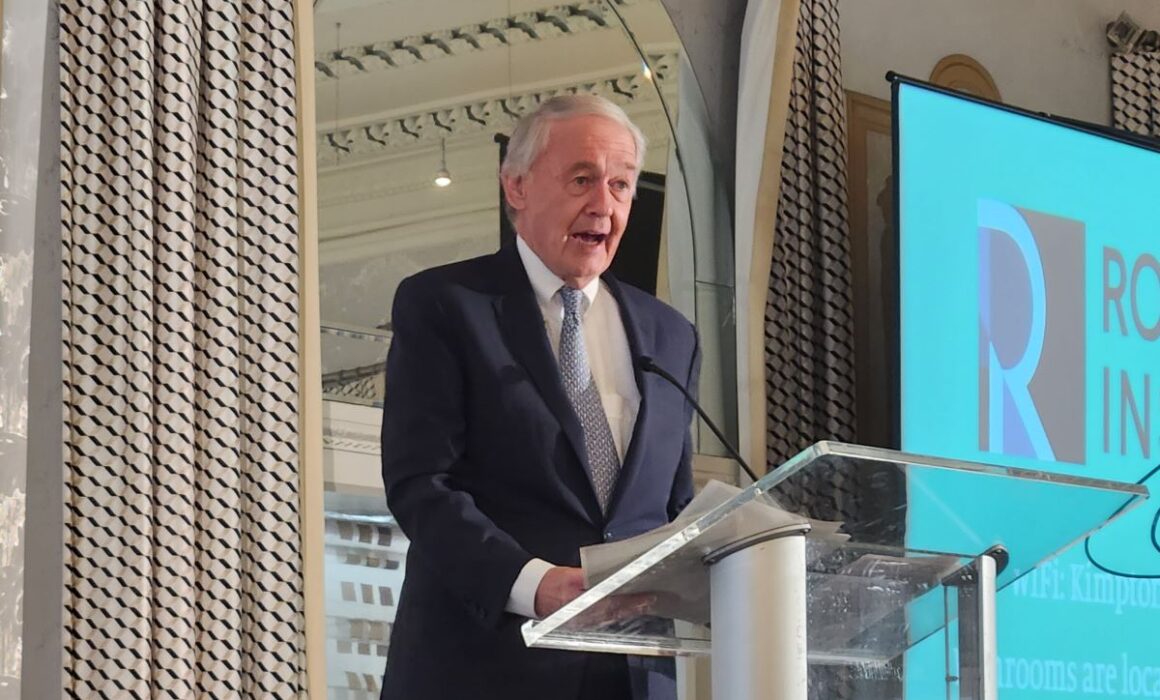Progressive Ideas for Permitting Reform
March 24, 2023
A green transition that centers justice.
The Roosevelt Rundown features our top stories of the week.

Sen. Edward Markey unveils his Progressive Priorities for Clean Energy Development at Roosevelt's Building the Green Transition event on March 21.
Building the Green Transition
Efficiently greenlighting the development of renewable energy projects is crucial to implementation of the Inflation Reduction Act, and to the green transition more broadly.
But the conversation about how to streamline permitting processes has been dominated by proposals that would limit democratic participation and weaken environmental review. Such proposals would leave frontline communities more vulnerable to exploitation by polluting industries, and make it faster and easier to develop fossil fuel projects.
There are better options, as climate experts like Roosevelt’s Rhiana Gunn-Wright argue.
This past Tuesday, the Roosevelt Institute hosted a one-day, in-person conversation in Washington, DC, that highlighted those possibilities—Building the Green Transition: A Justice-Centered Vision for Permitting Reform.
“[T]here are many ways to advance climate justice and maintain public participation while supporting and streamlining the permitting of renewable energy projects and the transmission these projects will require,” Gunn-Wright said in her opening remarks.
“The ideas that you will hear today are some of the reforms best suited to address some of the larger issues that threaten to stymie the build-out of renewable energy.”
Among those sharing ideas was keynote speaker Sen. Edward Markey, who unveiled his Progressive Priorities for Clean Energy Development.
Learn more about the event and expert panelists, and read Rhiana Gunn-Wright’s opening remarks.
A Golden Share
The 2018 rollback of Dodd-Frank regulations made the Silicon Valley Bank collapse more likely, as Roosevelt fellow Todd Phillips explained.
“But simply turning the dial back to 2018 is not enough. We need to think bigger and bolder,” Roosevelt senior fellow Saule Omarova writes in a New York Times guest essay.
“While rebuilding and strengthening the existing regulatory and supervisory tools, we should also explore new, potentially more effective ways to protect the American public from financial crises. One big, outside-the-box idea is to create a ‘golden share’ that the federal government would hold in certain systemically significant banks.” Read on.
Banking for the People
Yesterday, the CalAccount Blue Ribbon Commission convened a regular session meeting to discuss the findings of “Banking for the People: Lessons from California on the Failures of the Banking Status Quo,” a 2022 issue brief by Roosevelt’s Emily DiVito.
“Our banking system creates a damaging, multitiered economy that locks out families who can’t afford to participate and inhibits government policy aimed at helping the most economically vulnerable,” DiVito told the commission, which formed in 2022 to assess the feasibility of California implementing a no-cost, no-fee banking program designed to protect consumers who lack sufficient access to traditional financial institutions.
“[S]urvey results from a diverse sample of California’s banks demonstrate that opt-in-only solutions have left clear coverage gaps that will inevitably always remain without federal, state, and/or local public-interest interventions.”
What We’re Reading
The Fed’s Silicon Valley Bank Cover-Up Won’t Work [feat. Roosevelt’s Mike Konczal and Todd Phillips] – The American Prospect
Yes, We Should Remove the Cap on FDIC Insurance—but Not for All Accounts [by Phillips] – American Banker
A Big Question for the Fed: What Went Wrong with Bank Oversight? [feat. Roosevelt fellow Lev Menand] – New York Times
Data and Democracy at Work: Advanced Information Technologies, Labor Law, and the New Working Class – Brishen Rogers

